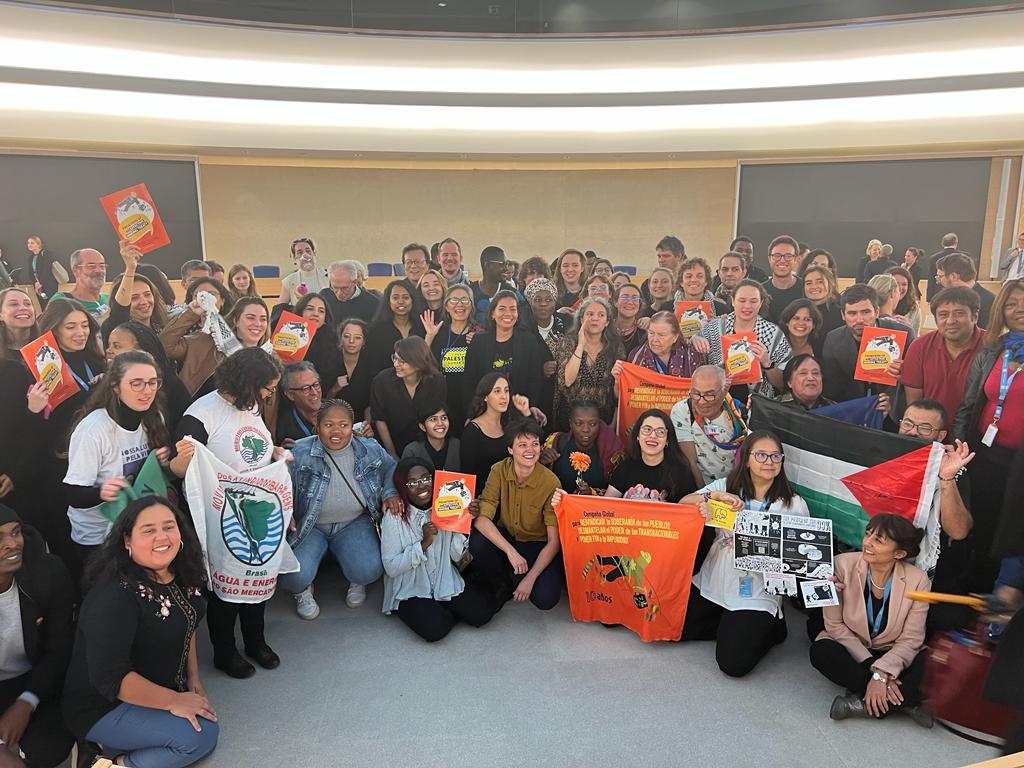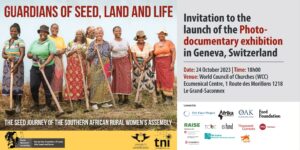
Statement by the Global Campaign to Reclaim Peoples’ Sovereignty, Dismantle Corporate Power and Stop Impunity
November 2023
The 9th session of the Open-Ended Intergovernmental Working Group (OEIGWG) to elaborate a United Nations Binding Treaty on Transnational Corporations (TNCs) and other businesses that have a transnational character with respect to human rights was held in Geneva from 23-27 October 2023. This round of negotiations represented an important milestone in the fight against TNCs’ impunity for human rights and environmental violations, and concluded with a clear message: social movements, trade unions, indigenous peoples, affected communities and civil society organisations, along with many states of the Global South, are committed to protecting this process from the interests of those who insist on putting corporate profits before the rights of peoples and the planet.
As every year, at the occasion of the session of the OEIGWG, the Global Campaign to Reclaim Peoples’ Sovereignty, Dismantle Corporate Power and Stop Impunity (Global Campaign) organised a week of mobilisations with activities both inside and outside the UN building (see agenda below). A delegation of 73 people from Asia, Africa, Latin America, the United States and Europe attended the formal session, other related events, organised events inside the UN, a photo exhibition and demonstrations. These interventions showed the Global Campaigns’ commitment to the elaboration of an ambitious Binding Treaty reflecting the needs and interests of peoples affected by TNC’s violations.
A new bloc of countries from the Global South challenges the Chairmanship
The opening of the week of negotiations began in a combative manner: for more than four hours, a group of states from the Global South rejected the Chair’s attempt to impose an illegitimate text as the basis for negotiations. As underlined by the African Group, which represents the 54 African states, the updated draft treaty issued in July 2023 by the Chair of the OEIGWG (the Ambassador of Ecuador) was constructed in a non-transparent and non-inclusive manner through adding and/or deleting elements and provisions without clear criteria or arguments. For these reasons, the African Group demanded that the updated draft be withdrawn from the table and the previous third revised draft be taken back as the basis for negotiations. Moreover, as consistently challenged by Latin American countries such as Cuba, Honduras, Venezuela, Colombia and Bolivia, and Asian states such as Pakistan and Indonesia, along with the African Group, the new draft proposed by the chair sought to impose on the Working Group a fundamentally different scope of application of the Binding Treaty than that mandated by Resolution 26/9, the document establishing the OEIGWG that has governed this process since 2014. This Resolution defines that the scope of application of this Treaty should focus on TNCs and other businesses that have a transnational character.
Most of the Global South spoke loud and clear: this process was initiated with the aim of filling the gap in international law that allows TNCs to violate human and environmental rights with impunity. Expanding the scope of the Treaty to regulate “all business enterprises”, as proposed by the Chair and openly advocated by Global North states and representatives of the corporate sector, contradicts the original intent of the process. Based on this proposal, the treaty would establish common provisions to regulate companies with very different structures and activities, which would not only be unfair, but would also make its implementation complex and ineffective.
Negotiations on the text move forward, strengthening Resolution 26/9
In the end, the Chair succeeded in dismissing the African Group’s request to revert to the previous draft; however, pressure from Global South states prevailed to at least use the updated tracked changes draft (which includes the previous elements that were arbitrarily removed from the Chair’s version). Many states from the Global South, along with the organisations and movements of the Global Campaign, continued to denounce these manoeuvres and question the intentions behind them.
Notwithstanding this hectic first day, the negotiations on the revised draft began with unprecedentedly strong and constructive participation of states committed to Resolution 26/9, both in number and in the quality of interventions. Thanks to this participation, important provisions were reintroduced into the negotiating text such as: direct obligations for transnational corporations; the primacy of human rights over free trade and investment agreements; the importance of recognising and including the concept of affected communities; the importance of establishing that TNCs not only abuse human rights, but also violate them; and the need to strengthen provisions to establish accountability along value and production chains.
During the intense negotiations that took place in the final days of October, these states took a hard line and stood firm, legitimately owning a process of which they are a part and determinedly defending Resolution 26/9.
A new attempted coup
Before the end of the week of negotiations, the Chair of the Working Group presented a proposal that smacked of malicious manoeuvring: as a conclusion to the week, he proposed that the OEIGWG request a new resolution from the Human Rights Council with the aim of renegotiating the mandate of the process, arguing a lack of consensus and financial resources. This was a manoeuvre aimed solely at derailing the Binding Treaty process (it is worth noting that in July 2023, during a consultation of the Western Group, a proposal to “clarify” the mandate of the OEIGWG through a new resolution was discussed). The proposed new resolution was met first with surprise and then with outright rejection by the states present in the room, with the exception of the representatives of the United States and the European Union.
The active commitment of the Global South bloc of countries, social movements, affected communities, Indigenous Peoples, trade unions and civil society organisations to the process established by Resolution 26/9 and to the rights of peoples and the planet brought an end to this attempted coup by the Chair. The alleged “lack of consensus” he used to justify the need for a new Resolution simply did not match the reality: more than 60 States spoke in unison on the clarity of the scope of Resolution 26/9 focused on TNCs and other transnational corporations.
After intense negotiation by States on Friday morning, the week’s official conclusions gave reason to the advocates of this historic process. Not only was the short-lived proposal for a new resolution dropped, but the importance of continuing negotiations in accordance with the objectives and provisions set out in Resolution 26/9 was reaffirmed. In addition, States agreed on the importance of finding new financial resources to advance the negotiations, including through transparent inter-sessional consultations where all States democratically discuss and agree on how to continue the work on the elaboration of the Treaty. We urge the Working Group to move away from debates and discussions informed by “experts”, of which we have had enough. Instead, we believe that the voices and experiences of people and communities affected by transnational corporations’ violations, who are the real experts, should be heard and prioritised.
And now?
Many challenges lie ahead. We know that a strong and effective Binding Treaty will change the prevailing power imbalance that allows some to profit from the dispossession and death of others. The unequivocal rejection of a new resolution was a resounding victory for the states of the Global South and for the Global Campaign, and a real challenge to the powers that seek to undermine the Treaty and that will not stand still in the face of this outcome of the negotiations.
These constant attempts to boycott and erode the Treaty are proof that the TNCs and their agents will use all their forces to try and prevent this process from moving forward. The corporate sector, the United States (which never ratifies human rights treaties) and the European Union (which does not yet have a mandate to negotiate this treaty) are fully committed to destroying, or at least diluting, the process. Other countries of the Global North (Switzerland, Israel, Japan, Australia, Canada), as well as some countries of the Global South subjugated to the corporate and imperial interests of the North, are following the bandwagon. The battle for a Binding Treaty worthy of the name will therefore be intricate and not without its pitfalls and obstacles.
Looking ahead, the Global Campaign remains fully committed to the Binding Treaty, bridging the needs and aspirations of movements, trade unions and affected communities with the legal drafting of a Treaty capable of changing the world as we know it. We echo the calls of the states of the Global South for transparency and a clear methodology capable of building consensus for negotiations, rather than imposing whims.
Finally, we denounce the increasing securitisation of the UN space. From being a forum that supposedly seeks to protect and promote human rights, it has become, in practice, a space that criminalises expressions of solidarity and dissent and that exacerbates vulnerabilities. It is now a space that ironically ignores the multiple strategies that those who defend human rights are entitled to deploy. Attempts to silence support for Palestine were frequent throughout the week, despite the genocide that unfolds before our eyes.
The demonstration in front of the Broken Chair on Monday 23 October, co-organised by the Global Campaign, showed that people’s power can resonate in the negotiating room. It showed that Resolution 26/9 is not to be trifled with. As Paula Goes of the Movement of People Affected by Dams in Brazil stated on behalf of the Global Campaign:
“Resolution 26/9 is a historic victory, the result of years of struggle by millions of peoples whose Human Rights are systematically violated by transnational corporations. This process is therefore a mandate for those murdered in Marikana for striking to demand better working conditions from Lonmin; for the indigenous children dying of cancer in Ecuador because of Chevron’s oil spills; for the workers murdered in Rana Plaza, and for the millions of people currently imprisoned in Gaza and subjected to a genocide directly aided and abetted by transnational corporations”.
The memories of our peoples demand accountability and justice for corporate human rights violations, and thanks to the efforts of many states, and the Global Campaign and its allies, this possibility remains in our hands. As we mark a decade of this struggle next year, we will march stronger and more committed than ever.
Activities of the Mobilisation Week 2023:
Monday 23 October
– Side event: “How can the Binding Treaty support parliamentary work to defend Peoples and the Planet against TNC violations?”
Video: https://justice5continents.net/fc/viewtopic.php?t=1155
– Demonstration: Dance for change, move the chair
Tuesday 24 October
– Side event: “People’s Tribunal: Transnational corporations on trial”.
Video: https://justice5continents.net/fc/viewtopic.php?t=1156
– Photo-documentary exhibition by the Rural Women’s Assembly

Thursday, 26 October
– Side event: “Cases of human rights violations and eco-destruction”.
Video: https://justice5continents.net/fc/viewtopic.php?t=1157
Useful Global Campaign documents :
- First Impressions Statement on the Updated Draft Treaty (September 2023)
- Frontiers of an Effective Treaty (2023)
- 10 years past, 10 years to go. The Global Campaign towards 2032 (2022)
- Key elements defended by the Global Campaign, based on the experiences of resistance by communities affected by TNCs (2022)
- Document of Elements for an International Tribunal on TNCs and Human Rights (2022)
- Proposed Treaty on TNCs and human rights (2017)
For more information: https://www.stopcorporateimpunity.org/binding-treaty-un-process/
